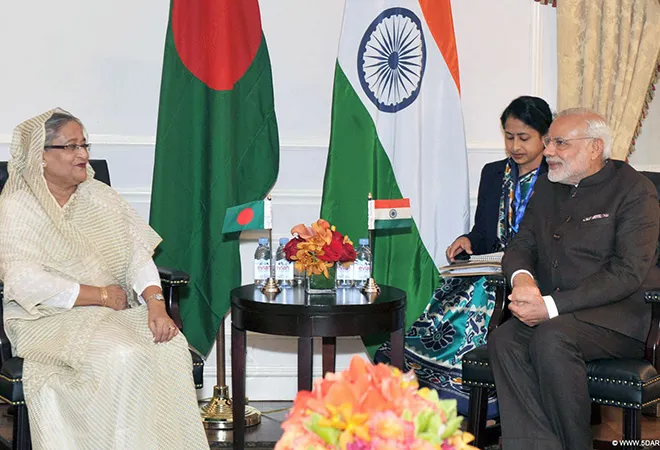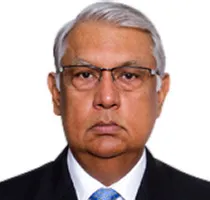-
CENTRES
Progammes & Centres
Location

Poised for the 11th general elections, with polling day on 30th December, Bangladesh’s political dynamics is in a vortex. Incumbent Prime Minister Sheikh Hasina
The former President and estranged Bangladesh Nationalist Party founder member has also leading the Jukto Front, a coalition of his Bikalpadhara party and sundry other political parties. The JF has entered into an electoral alliance with the AL and hope to get 20-30 seats in the next Parliament. This may be an ambitious objective but helps the AL in weakening the JOF as both fronts depend on the same group of voters.
For Bangladesh’s fractious polity and winner-take-all political discourse, allegations of electoral malpractices and violence are par for the course. Every incumbent government is accused of manipulating various institutions to harass and weaken the opposition. The JOF’s shrill campaign against the government, though exaggerated, has some takers and is part of a planned effort to discredit the government of PMSH. The use of State machinery, particularly the police, to intimidate and obstruct opposition candidates, workers and voters heads the list of allegations against the government. The opposition has also alleged that the BNP Chairman and former PM, Begum Khaleda Zia, has been incarcerated for corruption in politically motivated cases and PMSH’s government has cracked down on dissent in the social media. The opposition alleges that their candidates are not being allowed to campaign properly and are facing violent attacks from Awami League workers with the support of the police.
The campaign against the government has both domestic and international dimensions, with the JOF receiving support from domestic sources, overseas Bangladeshis, Pakistan’s ISI and certain quarters in Saudi Arabia and UAE.
Recently, a voice recording of a senior BNP leader soliciting financial help from an ISI operative in Dubai and requesting the latter to involve China in the effort, surfaced in the social media. The BNP leader has rejected the recording as fake. A former personal assistant of BNP’s Vice-Chairman Tarique Zia has been caught with a huge amount of cash which may have been sent from abroad for use in the elections.
Living in enforced exile in UK, Tarique is reputed to have laundered a huge amount of money, raised by massive corruption, during his mother Khaleda Zia’s term as PM till 2006. He has been convicted of money laundering and also sentenced to life imprisonment for being part of the conspiracy to kill PMSH in the infamous grenade attack case. Tarique remains a controversial and reviled figure, suspected of collaborating with Pakistan’s ISI which reportedly contributes funds for his luxurious lifestyle in UK and also for the opposition’s electoral campaign. The Pakistani deep state has no love lost for PMSH and is desperate to unseat her. The BNP and Jamaat-i-Islami
The JeI, a prominent coalition partner of Begum Khaleda Zia-led Bangladesh Nationalist Party
Among the JeI candidates nominated by the JOF are some known collaborators of the Pakistani Army and complicit in the genocide during the 1971 War of Liberation.
Supporters of the BNP and JeI in the USA have mounted lobbying efforts with American Congressmen and goaded them to pass a Congressional Resolution to promote “free, fair, transparent and credible election”. Such Congressional Resolutions have no legal implication and are hortatory in nature. Professional lobbyists contribute to elections funds of interested Congressmen who introduce such resolutions. The wording of the Resolution recognizes the remarkable economic and social progress made by Bangladesh, much of it under the leadership of Sheikh Hasina in the last decade that she has been Prime Minister. Some negative publicity has ensued by subtle implication that the elections may not be free, fair, transparent and credible. This is the primary purpose of this Resolution. It has, however, no impact on the ground and designed for publicity and to bring pressure on the Hasina government.
PMSH’s government has also been criticized for delaying issuing visas to some American election observers, prompting the US State Department to express “disappointment”. Relationship between the USA and Bangladesh has been stable but cool, because of the adversarial role of the USA during the War of Liberation. There is also a deep-seated belief that the USA was part of the conspiracy to eliminate Sheikh Mujibur Rahman, Sheikh Hasina’s father and leader of the independence movement. Moreover, the AL has always believed that the Americans are more comfortable backing the BNP and the JeI.
The Americans have peddled the narrative that the JeI is a moderate Islamist party and should not be shunned, lest they go underground and resort to violence.
Critics of PMSH have accused her of moving Bangladesh towards an autocratic state. What must be particularly galling for PMSH and the Awami League is the face of the JOF, Dr Kamal Hossain, the eminent jurist who was one of them and now a staunch critic, leading the opposition campaign to defeat PMSH. Dr Hossain has issued a public appeal to India not to look the other way while the process of election is being vitiated. Dr Hossain is being compared with the 92-year old Mahathir Mohammad in Malaysia and speculation is rife on whether the 82-year old Dr Hossain is a putative Bangladeshi Mahathir. Secular supporters of PMSH and AL are also aghast at the indulgence given to Islamist groups like the Hefazet, a country wide organization controlling many Madrassas. The Hefazet, has demanded inter alia that the national anthem be changed since it is written by a Hindu – Nobel Laureate Rabindranath Tagore.
Public perception in Bangladesh has solidified in the belief that India is keeping aloof and refusing to get involved in the elections. In the long term, this perception should be fostered and India should remain overtly neutral.
The Bangladesh election, despite all shortcomings, is certainly not lacking in participation unlike the election in 2014 which was boycotted by the BNP and its allies. Bangladesh may be an imperfect democracy but no democracy is perfect. In the index of democratic functioning Bangladesh may not score very high but it is far ahead of many democracies in South Asia. As Mark Twain once famously said that rumours about his death were exaggerated, so too are rumours about the death of democracy in Bangladesh.
The views expressed above belong to the author(s). ORF research and analyses now available on Telegram! Click here to access our curated content — blogs, longforms and interviews.

Pinak Chakravarty was a Visiting Fellow with ORF's Regional Studies Initiative where he oversees the West Asia Initiative Bangladesh and selected ASEAN-related issues. He joined ...
Read More +